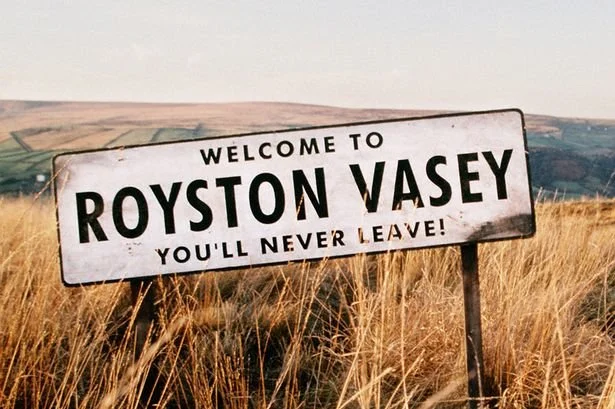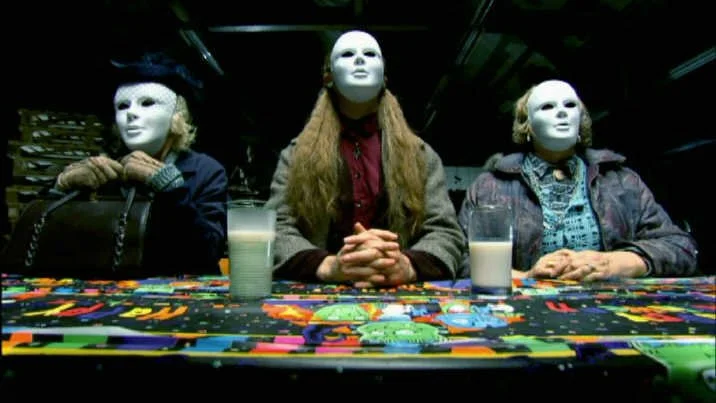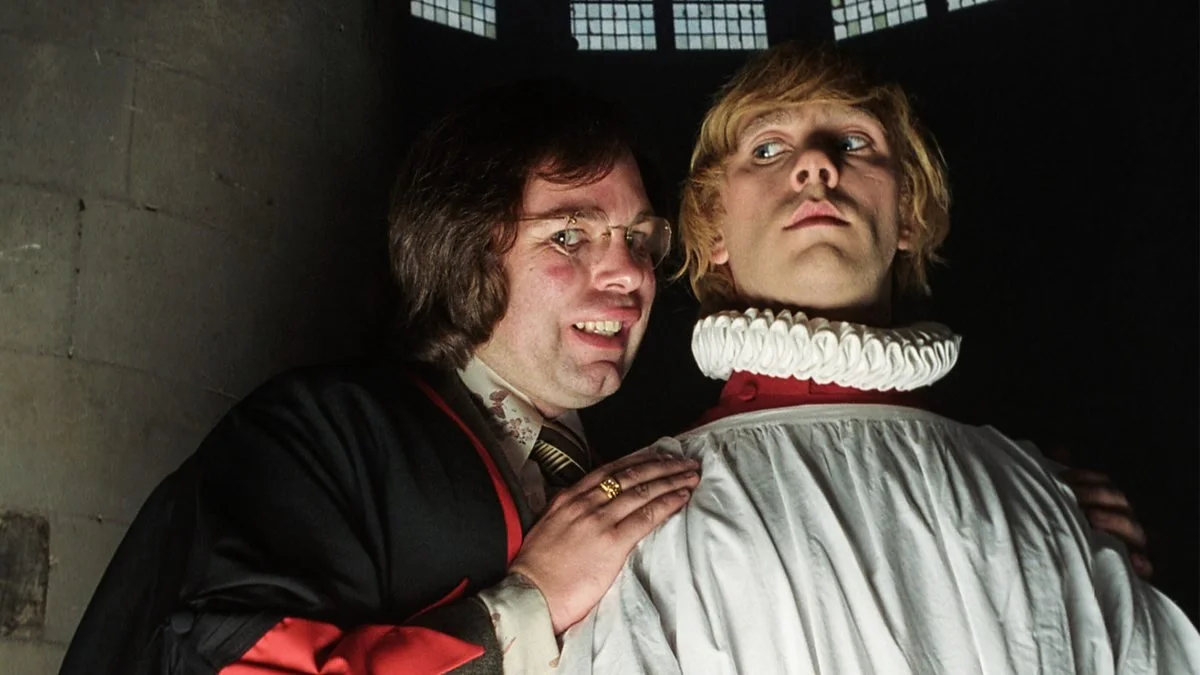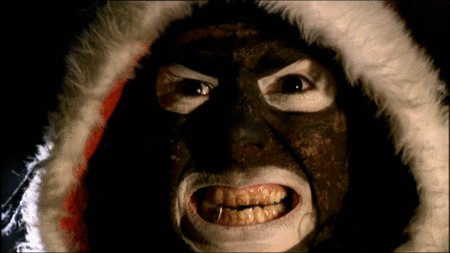[Editorial] 12 Ghouls of Christmas: League of Gentlemen Christmas Special – Yule Never Leave
When downloading episodes of The League of Gentlemen from the UK GOLD on demand service, each episode is now preceded by a disclaimer: the following programme is a classic comedy which reflects the broadcast standards, language and attitudes of its time. Some viewers may find this content offensive. While it is difficult to imagine that any of the characters in the League of Gentlemen are intended as positive representations or indeed reflect the values of the team behind them, the show itself is a dark comedy with some elements that some will understandably wish to avoid as well as being part of a continued, troubling legacy in British comedy surrounding the use of blackface and transphobic tropes that have recently garnered further attention and scrutiny.
Here at Ghouls we are keen to keep that sense of horror alive year round and the Christmas season provides many opportunities for a turn to the sinister. Whether you head for otherworldly arrivals and magic goings-on or the threat of family gatherings gone wrong, Christmas undoubtedly provides plenty in the way of horror fodder. Couple this with the UK’s long-standing tradition of sharing ghost stories at Christmas and it is no surprise that celebrated comedy-horror outfit The League of Gentlemen would indulge themselves in a special episode that also offered them further opportunity to pay homage to more of their influences. Almost all members of the League have gone on to contribute further to the creepy Christmas canon on television. Mark Gatiss has taken up the mantle of the traditional Ghost Stories for Christmas, including queer-focused The Dead Room, terrifying but satisfying court drama Martin’s Close and continuing this year with The Mezzotint. Reece Shearsmith and Steve Pemberton have, of course, produced another chilling Christmas special in their incredibly dark director’s commentary The Devil of Christmas edition of Inside No9. These additions to the Christmas schedule continue to show how the group evolve both as performers and writers, playing with the structure of television with a sense of mischievous glee.
The special is perhaps the best early example of the League’s fondness for Amicus anthology films. Writer Jeremy Dyson would go on to further explore this in his and Andy Nyman’s excellent Ghost Stories. Positioning notoriously bad-tempered Reverend Bernice (Reece Shearsmith) at the centre of the tale gives them a suitably Christmassy wraparound for the episode. Kicking off with a series of petty cruelties, the stage is set for that usual Christmas trope of the mean non-believer becoming a convert to Christmas spirit by the narrative’s close. In the hands of the League, however, this narrative is subverted, twisted and treads plenty of dark territory. Perhaps unsurprisingly, given the make-up of the team, the Christmas special features (aside from Bernice in the wraparound) a host of primarily male fears coming to the surface. As a result, this article seeks to explore those themes a little further. While the subtitle Yule Never Leave was not included at the episode’s air date on 27th December 2000 (included instead on later releases), it provides the best justification for the prevailing theme of both the special and the wider series. While Royston Vasey’s town slogan of ‘You’ll Never Leave’ was established early in the show and the events of the first two series indicated that this was more than an idle threat, it is not until the special that Vasey itself begins to feel almost supernaturally cursed. In many ways, the Christmas special sets the stage for the events of series three, abandoning the laughter track and moving further away from the sketch character comedy into a more in-depth and intricately stitched view of Royston Vasey. While the Christmas special represents a break from series continuity to some extent, it lays powerful groundwork for the kind of narrative that the League are able to provide which was warmly welcomed by their fans. Like Tubbs’ Precious Things, in Yule Never Leave, Vasey becomes a snow globe, encasing its characters within a snowy sphere.
Solutions
The first of the episode’s stories is Solutions, brought about by Charlie Hull’s visit to Bernice. Charlie (Steve Pemberton) is seeking comfort for a series of dreams he has had recently, all focused on his wife Stella (Reece Shearsmith). The dream begins in the same way as viewers have always encountered Charlie and Stella: a row between them escalates, the pair shouting their barbs at one another through Julie, their daughter and conduit for their harsh words. The opening joke concludes in the same way as many of their encounters – Julie is not in the house and both are aware.
While Charlie and Stella’s domestic hell is a grotesque space, it is also a reasonably normal one – aside from their fierce rows, their lives are not unusual, as they are often seen going out for a meal in the town or playing board games. By having Charlie describe nightmares he has been having, it allows the narrative to become more exaggerated and taken out of that domestic space in order to explore more references to other media and involve the rest of the town. As Charlie discovers a passion for line dancing, we are also introduced to two new characters, Lee (Mark Gatiss) and Donna (Liza Tarbuck). Tarbuck’s casting is reasonably rare for the League, who often play the female characters themselves. However, Donna is made just as monstrous as any of their creations, as Leon Hunt describes Liza as being given ‘an oily complexion cruelly emphasised by a fish-eye lens’ (2008: 90). Throughout this section, we are invited to see the women involved as Charlie sees them – monstrous, threatening, and harsh. Tarbuck’s performance is excellent, perfectly believable as the kind of character who would associate with Stella.
Stella heads to Solutions and in this moment, Charlie’s anxieties are revealed in dramatic fashion. Not only does he subconsciously believe that his wife wishes him real harm, but there exists a secret society of all Royston Vasey women ready, willing, and able to enact punishment if their requirements are met. Building on the back of two previous series, the characters are easily identified with their rantings about pens and carrier bags offering cameo appearances for (among others) Pauline and Mrs Denton.. As a voodoo ritual descends into clumsiness, Charlie is left humiliated. Shortly after, we are witness to Stella and Lee, now seemingly together with Charlie still being spoken of poorly by Stella. Curiously, despite this being Charlie’s dream, Stella does not emerge unscathed, having fallen foul of Donna’s own request to Solutions, offering a final Amicus-like sting which sees Lee murdered and Stella taking the blame. This, of course, is a dominant theme in anthology horror where a wrongdoer faces a karmic punishment. Charlie (or at least his subconscious) is fearful not only of the women who seek to hurt him, but also of how their machinations put others at risk too.
Bernice is keen to write this off as a particularly vivid ‘cheese dream’, with the overall aim of getting Charlie to leave. As the episode progresses, she experiences various flashbacks to a traumatic Christmas from her childhood, the first of which is seeded here. The idea of Christmas as a recurring event that brings forth these memories is a further weight added to the prison that is Royston Vasey.
The Vampire of Duisburg
The second section introduces us to a new character, Matthew Parker (Andrew Melville) who appears to Bernice to tell of his time in Duisburg as a young man in 1975. As a previously unseen character, Matthew comes as a mystery – a dishevelled older man who almost falls into the church. The name Duisburg will be instantly familiar to League fans as the home of Herr Lipp (Steve Pemberton) and here we receive an alternative version of that character, but one that plays on similar jokes and sense of menace. The male fear in this section centres around being sent to a strange location, but more potently, becoming an object of desire for an aggressive and unpleasant, possibly supernatural being. Matthew’s distress as an older man sets up the long-lasting damage that the events we are about to hear have had upon him.
Notably, Herr Lipp takes a particularly horrific turn by the close of series two. Having lusted after schoolboy Justin (Blake Ritson) for a period, an angry reaction to rejection saw Lipp bury him in the garden, leaving only a small tube protruding from the ground for limited breath. It is one of the more overtly disturbing ends for a character, especially one so young that confirms Lipp as a dangerous predator. Transporting this character to 1975 in a tale of vampirism strengthens that thread of predation and further probes the idea of male vulnerability.
The segment is punctuated by Herr Lipp’s trademark homoerotic innuendo and malapropisms, initially amusing Matthew (Reece Shearsmith taking up the character for flashback scenes) but soon Lipp’s barely concealed attraction to him becomes a barrier between them. Lipp is a choirmaster, although every mention of the word choir is mangled to sound more like queer. True, what is being done here is not subtle, but when have vampires ever been subtle in their presentation of bloodlust as deeply homoerotic? Herr Lipp becomes a predator in supernatural terms in addition to what we already know about the tastes of his Vasey counterpart much later. Thankfully, Shearsmith playing Matthew puts a Dawson-casting style spin on events and the episode never suggests any interest in the younger boys, although some scenes skirt around it enough to make the viewer uncomfortable, without becoming explicit.
If the first section was a nod towards Eyes Wide Shut and karmic punishment in anthology films, we find ourselves in more classic horror territory here, invoking the likes of Nosferatu through dialogue and a curiously familiar shadow on the wall. The lean into gothic tradition seeps into every frame of this section, with looming toys and cupboards surrounding Matthew in his comically undersized bed. In addition to these influences, there is also a clear nod to Psycho as Lipp moves a picture frame in order to survey Matthew alone in his room. There is a sense of the group having fun with the conventions of both voyeurism and gothic tradition, Shearsmith’s Matthew is anything but graceful when observed, quickly down to his pants and scratching himself. We return to this view of Matthew later during a nightmare sequence, the camera tracking at crotch level as he opens a cupboard with a key that has been handed to him. Again, we are far away from the world of subtlety or nuance with the suggestion that Lipp is either gay or a vampire both seeming equally distressing to Matthew, who finds himself caught in his gaze. The nod to Psycho hints more towards violence than gothic horror – we are invited to draw parallels between Lipp watching Matthew as a precursor to violence in the same way as we read Norman Bates watching and then murdering Marion Crane. Leon Hunt frames how we see Matthew as a ‘queer gaze, seeing him exactly as Lipp does’ (2008: 95), although I would tend to suggest that the overall effect is still a comic one, rather than seeking to invite a desire-based gaze.
Following the same thread as the first section, dreams offer further opportunity for the group to play with overt horror elements. Matthew is besieged by spooky goings-on at night and the desperately unsubtle dream in which he finds a version of himself hidden within a cupboard. Steve Pemberton’s performance may be the standout of this section. His Lipp cuts a lonely figure, injecting some pathos into proceedings, even if that is mostly through a line borrowed from Nosferatu the Vampyr. This is not to say there is no threat here either, with Pemberton producing a genuinely chilling take of Lipp downing a red liquid glimpsed through a crack in a door. This sinister look tracks with what we know about the Herr Lipp who will arrive in Royston Vasey many years later – a dangerous man capable of incredible cruelty if provoked. When the discovery is made about the choir being vampires, he is clueless – the whole affair orchestrated by his wife Lottie (Mark Gatiss). The dramatic reveal of Lottie and the boys as the considerably more aggressive looking and less sexualised ‘front-toothed’ vampires is a striking moment. In this version of events, Lipp becomes a victim of his own repressed desires, allowing a traumatised Matthew to escape and falling prey to those he was originally positioned as a danger to.
On a personal note, this section contains my favourite scene of the special, in which Matthew confronts Lottie, resulting in a moment where the word ‘fangs’ is answered by ‘you’re welcome’ before a moment of shock echoes between the pair. It sums up the League of Gentlemen’s ability to indulge in sillier, lighter moments of humour amongst the darkness that lends such a great rewatch factor to their work. Lottie’s styling, including at least two incredibly distracting elements, are also enough to raise a laugh every time she appears. Lottie, like Stella is positioned as a dangerous and uncanny monster, whose husband’s inadequacy drives her to drastic action.
Again, Bernice is dismissive of Matthew’s tale of woe, declaring that she lost her mother at Christmas, furthering the building picture of her previous tragedy. This tallies with what we know about Bernice as a bad-tempered woman at the best of times, keen to downplay other people’s problems (fitting, given her initial incarnation in the radio show was as an Agony Aunt) and assert her own, out-dated, and unpleasant beliefs at every turn. That she is continually placed in a position to be comforting whilst simultaneously being anything but excellently subverts the idea of the older, religious woman as a caregiver and Shearsmith’s performance of growing annoyance with the visitors injects a fresh energy.
Curse of Karrit Poor
The last story involves Dr Edmund Chinnery (Mark Gatiss) – Royston Vasey’s vet, who appears in the very first episode of the series. All of Chinnery’s appearances at first lean into the idealised view of a countryside vet, arriving at locations via bicycle, fully suited with a calm, friendly voice. Despite his polished appearance, the first time we meet the character he has managed to euthanise the wrong dog at a secluded farmhouse. From there, he literally causes a tortoise to explode, drags a spaniel under his bicycle wheels and invites catastrophe wherever he goes, resulting in loss of life to animals. Appearing to Bernice after the latest instance, he begins to lament that he may in fact be cursed.
Curse of Karrit Poor represents the League’s fondness for world-building, both within the show and outside of it. The story of the curse was originally placed in A Local Book For Local People before being included in the special. On the DVD’s special features, the curse is also retold, featuring Gatiss delivering the story from an armchair, very much invoking the spirit of sharing Christmas ghost stories. As well as highlighting the group’s ability to span different media types, it also acts as an example of enriching the lore around the characters. This section contributes the most potent sense that all of Royston Vasey’s residents are doomed to a kind of cyclical relationship across time with the same recurring characters, repeating the same mistakes. This is furthered by brief moments in which we see period versions of Pauline, Ross and Mickey – all locked in a struggle with one another that echoes their interactions at the job centre.
This being a Victorian-set tale and therefore more restricted to the realm of men as foremost in society, there are few women in this section that amount to anything more than a cameo (Pauline and Barbara). The fears within this section surround respectability, legacy, and professionalism as Chinnery’s ancestor leaves his prominent position as a well-respected vet to visit Royston Vasey. First encountering the incredibly energetic Singleton Boothby who speaks in near-nonsense (“All my doors are open to you Chinnery, except the ones that are closed”) and later finding himself disturbed by loud sobbing in the house at night, Chinnery is thrown into a world that appears to be a crude parody of the gentlemanly culture he has left behind. When he finds the source of the upset, he settles to comfort Magnus Purblind, a bed-ridden man keen to tell him of a curse. As the colourful story, (charmingly rendered in borderline obscene paper shadow puppetry) rouses his interest, he lets his guard down, touching the monkey bollocks that hold the curse. Almost immediately, the veneer of respectable gentlemen is dropped, revealing everything as a trap that Chinnery will now be forced to deal with.
Originally doubting the curse, it soon becomes apparent in undeniable fashion, that Chinnery is indeed cursed. In this sense, the special has not only provided a dynamic, gag-filled final section but also provided a textural and narrative cohesion that works (albeit in a disbelief suspending, magical sense) to enrich an existing character, with a detailed background. Far more than presenting surface level characters, The League of Gentlemen often manage to provide layers of meaning to their creations, mixing horror, pathos, and comedy in everything they do. The sadness of a respected vet, reduced to being unable to carry out his profession across generations, speaks to the circle of characters who are kept confined to this unusual space.
Bernice being Bernice, Chinnery’s sad story appears to cheer her up a little and soon she experiences a mild uplift, heading outside to apologise for her earlier cruelty. As she does so however, all the hints about her own troubled past come to a head as she is greeted by a figure in a Santa costume. Swiftly revealed as Papa Lazarou, strongly inferred to be a supernatural character (he has not aged since abducting Bernice’s mother, for example), he captures Bernice in a bag and takes her away. This final shock contributes to the series, with Lazarou having supposedly fled Royston Vasey during the second series after finding the residents too scary. That Lazarou has seemingly been drawn back, despite his own fears of the residents because he can capture more women without being thwarted adds again to the feel of the town as an isolated and cyclical space doomed to repeat the same mistakes. While the special sits somewhat outside the main continuity of the wider series, it still enriches the characters, town and wider themes of being trapped, vulnerable and at the mercy of those around you. Merry Christmas indeed…
References
Hunt, Leon (2008) BFI TV Classics – The League of Gentlemen. Hampshire: Palgrave Macmilllan






![[Editorial] 5 Slasher Short Horror Films](https://images.squarespace-cdn.com/content/v1/5fe76a518d20536a3fbd7246/1696358009946-N8MEV989O1PAHUYYMAWK/Screenshot+2023-10-03+at+19.33.19.png)
![[Ghouls Podcast] Maniac (2012) with Zoë Rose Smith and Iona Smith](https://images.squarespace-cdn.com/content/v1/5fe76a518d20536a3fbd7246/1696356006789-NYTG9N3IXCW9ZTIJPLX2/maniac.jpg)
![[Editorial] If Looks Could Kill: Tom Savini’s Practical Effects in Maniac (1980)](https://images.squarespace-cdn.com/content/v1/5fe76a518d20536a3fbd7246/1694952175495-WTKWRE3TYDARDJCJBO9V/Screenshot+2023-09-17+at+12.57.55.png)
![[Editorial] Deeper Cuts: 13 Non-Typical Slashers](https://images.squarespace-cdn.com/content/v1/5fe76a518d20536a3fbd7246/1694951568990-C37K3Z3TZ5SZFIF7GCGY/Curtains-1983-Lesleh-Donaldson.jpg)
![[Editorial] Editor’s Note: Making a slash back into September](https://images.squarespace-cdn.com/content/v1/5fe76a518d20536a3fbd7246/1694354202849-UZE538XIF4KW0KHCNTWS/MV5BMTk0NTk2Mzg1Ml5BMl5BanBnXkFtZTcwMDU2NTA4Nw%40%40._V1_.jpg)
![[Editorial] 8 Mind Horror Short films](https://images.squarespace-cdn.com/content/v1/5fe76a518d20536a3fbd7246/1693504844681-VPU4QKVYC159AA81EPOW/Screenshot+2023-08-31+at+19.00.36.png)
![[Editorial] Eat Shit and Die: Watching The Human Centipede (2009) in Post-Roe America ](https://images.squarespace-cdn.com/content/v1/5fe76a518d20536a3fbd7246/1691245606758-4W9NZWE9VZPRV697KH5U/human_centipede_first_sequence.original.jpg)
![[Editorial] Top 15 Female-Focused Mind Horror Films](https://images.squarespace-cdn.com/content/v1/5fe76a518d20536a3fbd7246/1691247166903-S47IBEG7M69QXXGDCJBO/Image+5.jpg)
![[Editorial] 8 Body Horror Short films](https://images.squarespace-cdn.com/content/v1/5fe76a518d20536a3fbd7246/1690838270920-HWA5RSA57QYXJ5Y8RT2X/Screenshot+2023-07-31+at+22.16.28.png)
![[Editorial] Metal Heart: Body Dysmorphia As A Battle Ground In Tetsuo: The Iron Man (1989)](https://images.squarespace-cdn.com/content/v1/5fe76a518d20536a3fbd7246/1690190127461-X6NOJRAALKNRZY689B1K/Screenshot+2023-07-24+at+10.08.27.png)
![[Editorial] Top 15 Female-Focused Body Horror Films](https://images.squarespace-cdn.com/content/v1/5fe76a518d20536a3fbd7246/1689081174887-XXNGKBISKLR0QR2HDPA7/download.jpeg)
![[Editorial] Editor’s Note: Getting sticky, slimy & sexy with body horror](https://images.squarespace-cdn.com/content/v1/5fe76a518d20536a3fbd7246/1689072388373-T4UTVPVEEOM8A2PQBXHY/Society-web.jpeg)
![[Ghouls Podcast] The Last House on the Left (2009) with Zoë Rose Smith and Jerry Sampson](https://images.squarespace-cdn.com/content/v1/5fe76a518d20536a3fbd7246/1687863043713-54DU6B9RC44T2JTAHCBZ/last+house+on+the+left.jpg)
![[Editorial] They’re Coming to Re-Invent You, Barbara! Night of the Living Dead 1968 vs Night of the Living Dead 1990](https://images.squarespace-cdn.com/content/v1/5fe76a518d20536a3fbd7246/1687199945212-BYWYXNBSH00C4V3UIOFQ/Screenshot+2023-06-19+at+19.05.59.png)
![[Editorial] 8 Short & Feature Horror Film Double Bills](https://images.squarespace-cdn.com/content/v1/5fe76a518d20536a3fbd7246/1687770541477-2A8J2Q1DI95G8DYC1XLE/maxresdefault.jpeg)

![[Editorial] Soho Horror Film Festival: Interview with Aimee Kuge on Cannibal Mukbang](https://images.squarespace-cdn.com/content/v1/5fe76a518d20536a3fbd7246/1701808004722-9M8SZ2UXY52QBQBR4NTI/img20230818_15150780.JPG)
![[Editorial] 10 Films & Events to Catch at Soho Horror Film Fest 2023](https://images.squarespace-cdn.com/content/v1/5fe76a518d20536a3fbd7246/1700819417135-299R7L4P0B676AD3RO1X/Screenshot+2023-11-24+at+09.41.52.png)
![[Editorial] 9 Horror Nintendo Switch Games To Play](https://images.squarespace-cdn.com/content/v1/5fe76a518d20536a3fbd7246/1697214470057-3XZXX8N4LYIMDFWS6Z3P/Screenshot+2023-10-13+at+17.20.13.png)
![[Mother of Fears] Mothering in Silence in A Quiet Place (2018)](https://images.squarespace-cdn.com/content/v1/5fe76a518d20536a3fbd7246/1696445921315-HZJ2DZYQIH6VVWXBO2YL/Screenshot+2023-10-04+at+19.52.29.png)
![[Event Review] Highlights from Mayhem Film Festival 2023](https://images.squarespace-cdn.com/content/v1/5fe76a518d20536a3fbd7246/1697624582491-MPT2VB9RRGU6OG7L6UKL/Mayhem+2023.jpg)
![[Editorial] Mayhem Festival: Interview with Thomas Sainsbury on Loop Track (2023)](https://images.squarespace-cdn.com/content/v1/5fe76a518d20536a3fbd7246/1697186472899-WC4RR0TW7L7LMFEBGPA2/Tom+Sainsbury.jpg)
![[Editorial] Keeping Odd Hours: A Retrospective on Near Dark (1987)](https://images.squarespace-cdn.com/content/v1/5fe76a518d20536a3fbd7246/1696445070868-HU9YIL3QPBCL1GW47R3Z/Screenshot+2023-10-04+at+19.36.53.png)
![[Editorial] 5 Female Focused Horror Book Recommendations](https://images.squarespace-cdn.com/content/v1/5fe76a518d20536a3fbd7246/1696441981361-52EQCTJ7AT2QF1927GM7/919xtm6d3fL._AC_UF894%2C1000_QL80_.jpg)
![[Editorial] What to Watch at This Year's Cine-Excess International Film Festival 2023](https://images.squarespace-cdn.com/content/v1/5fe76a518d20536a3fbd7246/1697213510960-REV43FEOZITBD2W8ZPEE/Screenshot+2023-10-13+at+17.01.15.png)
![[Editorial] Cherish Your Life: Comfort in the SAW Franchise Throughout and Beyond the COVID-19 Pandemic](https://images.squarespace-cdn.com/content/v1/5fe76a518d20536a3fbd7246/1695487675334-MYPCPYYZQZDCT548N8DI/Sc6XRxgSqnMEq54CwqjBD5.jpg)
![[Editorial] The Art of Horror in Metal](https://images.squarespace-cdn.com/content/v1/5fe76a518d20536a3fbd7246/1695486401299-E5H2JNNJT26HKN0CI7WC/Screenshot+2023-09-23+at+17.20.28.png)






















![[Editorial] 9 Best Slashers Released Within 10 Years of Scream (1996)](https://images.squarespace-cdn.com/content/v1/5fe76a518d20536a3fbd7246/1695478839037-LOFHGVM3H6BMSZW7G83M/Screenshot+2023-09-23+at+15.15.11.png)
![[Mother of Fears] Mother Vs. Monster in Silent Hill (2006)](https://images.squarespace-cdn.com/content/v1/5fe76a518d20536a3fbd7246/1695485781119-H6GNP0G3J2TLPAOIABV7/Screenshot+2023-09-23+at+17.11.56.png)
![[Editorial] 9 Terrifying Cerebral Visions in Horror Movies](https://images.squarespace-cdn.com/content/v1/5fe76a518d20536a3fbd7246/1693509801235-X23OL50T1DVGECH0ZJK2/MV5BMjQ0MTg2MjQ4MV5BMl5BanBnXkFtZTgwMTU3NDgxMTI%40._V1_.jpg)
![[Mother of Fears] I Don’t Wanna Be Buried in a Pet Sematary (1989) and (2019)](https://images.squarespace-cdn.com/content/v1/5fe76a518d20536a3fbd7246/1691328766069-QFNAVJOMFZVZ5CLU1RWM/Screenshot+2023-08-06+at+14.23.13.png)

I can sometimes go months without having a panic attack. Unfortunately, this means that when they do happen, they often feel like they come out of nowhere. They can come on so fast and hard it’s like being hit by a bus, my breath escapes my body, and I can’t get it back.